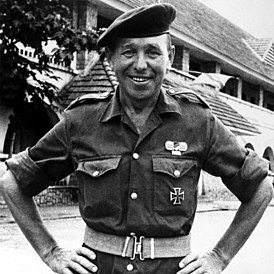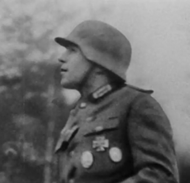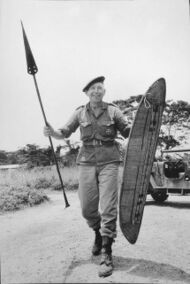Fritz Koehne (Pacifica): Difference between revisions
Weisserstein (talk | contribs) No edit summary |
Weisserstein (talk | contribs) No edit summary |
||
| Line 8: | Line 8: | ||
| birth_date = {{Birth date|1922|08|17|df=yes}} | | birth_date = {{Birth date|1922|08|17|df=yes}} | ||
| death_date = {{death date and age|1999|12|22|1922|08|17|df=yes}} | | death_date = {{death date and age|1999|12|22|1922|08|17|df=yes}} | ||
| birth_place = [[ | | birth_place = [[Crossen an der Salzach (Pacifica)|Crossen an der Salzach]], [[Weisserstein (Pacifica)|Weissersteiner Empire]] | ||
| death_place = [[Karlsdorf (Pacifica)|Karlsdorf]], [[Weisserstein (Pacifica)|Weissersteiner Empire]] | | death_place = [[Karlsdorf (Pacifica)|Karlsdorf]], [[Weisserstein (Pacifica)|Weissersteiner Empire]] | ||
| placeofburial = | | placeofburial = | ||
| Line 26: | Line 26: | ||
| children = [[Fritz Koehne (Pacifica)#Family life|Robert Koehne]]<br>[[Mekongo Siba (Pacifica)|Mekongo Siba]] (adopted) | | children = [[Fritz Koehne (Pacifica)#Family life|Robert Koehne]]<br>[[Mekongo Siba (Pacifica)|Mekongo Siba]] (adopted) | ||
| website = | | website = | ||
| nickname = | | nickname = "Smiling Death" <br> "Kybok Koehne" | ||
}} | }} | ||
{{Quote|''"Many see my adopted father as a warmonger, a dishonourable merc or scum. However, I can attest that behind the facade of war, Koehne was a deeply caring man with an enormous heart. A man just like any other."''|Gen. {{Pacifica|Mekongo Siba}} during a Sallodesian interview about his adopted father.}} | {{Quote|''"Many see my adopted father as a warmonger, a dishonourable merc or scum. However, I can attest that behind the facade of war, Koehne was a deeply caring man with an enormous heart. A man just like any other."''|Gen. {{Pacifica|Mekongo Siba}} during a Sallodesian interview about his adopted father.}} | ||
'''Fritz Sebastian Koehne''' (17 August 1922 – 22 December 1999) was a [[Weisserstein (Pacifica)|Weissersteiner]] soldier, military advisor, paramilitary trainer, and foreign fighter who fought in multiple wars abroad. He was influential in establishing several paramilitary groups abroad (namely the [[Kybok Dragoons (Pacifica)|Kybok Dragoons]] and the [[Pelinese Volunteer Legion (Pacifica)|Pelinese Volunteer Legion]]). This inadvertently made him an important and influential military figure in Weisserstein during the [[Cold War (Pacifica)|Cold War]]. He also adopted [[Sallodesia (Pacifica)|Sallodesian]] General [[Mekongo Siba (Pacifica)|Mekongo Siba]] during his time with the [[Kybok Dragoons (Pacifica)|Kybok Dragoons]] in the [[Sallodesian Bush War (Pacifica)|Sallodesian Bush War]]. | '''Fritz Sebastian Koehne''' (17 August 1922 – 22 December 1999), better known by his nicknames '''Kybok Koehne''' or '''Smiling Death''', was a [[Weisserstein (Pacifica)|Weissersteiner]] soldier, military advisor, paramilitary trainer, and foreign fighter who fought in multiple wars abroad. He was influential in establishing several paramilitary groups abroad (namely the [[Kybok Dragoons (Pacifica)|Kybok Dragoons]] and the [[Pelinese Volunteer Legion (Pacifica)|Pelinese Volunteer Legion]]). This inadvertently made him an important and influential military figure in Weisserstein during the [[Cold War (Pacifica)|Cold War]]. He also adopted [[Sallodesia (Pacifica)|Sallodesian]] General [[Mekongo Siba (Pacifica)|Mekongo Siba]] during his time with the [[Kybok Dragoons (Pacifica)|Kybok Dragoons]] in the [[Sallodesian Bush War (Pacifica)|Sallodesian Bush War]]. | ||
== Early life== | == Early life== | ||
Koehne was born in Crossen an der Salzach, [[Weisserstein (Pacifica)|Weisserstein]], in 1922. His father served in the Weissersteiner Reichswehr's 7th Army during the [[War of 1919 (Pacifica)|War of 1919]]. This would affect Koehne in his interest with military-related topics. At the age of eight he enrolled to a boarding school in Lindenburg and then commenced training for accountancy. He also joined the Landwehr, the reserve component of the Weissersteiner Reichswehr. In 1928, his sister, Marja, was born. It was also around this time he met Friedrich Josef von Lettow-Ermhau, who would later become one of the main patrons of the formation of the United Crabryan Duchy. | Koehne was born in [[Crossen an der Salzach (Pacifica)|Crossen an der Salzach]], [[Weisserstein (Pacifica)|Weisserstein]], in 1922. His father served in the [[Reichswehr (Pacifica)|Weissersteiner Reichswehr's]] [[7th Army (Weisserstein) (Pacifica)|7th Army]] during the [[War of 1919 (Pacifica)|War of 1919]]. This would affect Koehne in his interest with military-related topics. At the age of eight he enrolled to a boarding school in [[Lindenburg (Pacifica)|Lindenburg]] and then commenced training for accountancy. He also joined the [[Landwehr (Pacifica)|Landwehr]], the reserve component of the Weissersteiner Reichswehr. In 1928, his sister, Marja, was born. It was also around this time he met [[Friedrich Josef von Lettow-Ermhau (Pacifica)|Friedrich Josef von Lettow-Ermhau]], who would later become one of the main patrons of the formation of the [[United Crabryan Duchy (Pacifica)|United Crabryan Duchy]], and [[Alois Auernheimer (Pacifica)|Alois Auernheimer]], a writer who would later wrote Koehne's biography ''Kybok Koehne - The Biography of Fritz Sebastian Koehne''. | ||
===Weissersteiner Civil War=== | ===Weissersteiner Civil War=== | ||
Koehne's service into the Landwehr would eventually led to him seeing action during the [[Weissersteiner Civil War (Pacifica)|Weissersteiner Civil War]], and he joined the Reichswehr at the age of 18. He fought during the [[Siege of Lindenburg (Pacifica)|Siege of Lindenburg]] against both [[Straßrist Party (Pacifica)|Straßrist]] and [[Weissersteiner Communist Party (Pacifica)|communist]] forces. During the engagement, Marja would be killed during an assault by communist soldiers in the city's eastern districts. This was said to have caused Koehne to fall into a deep state of depression, which, according to his father, eventually morphed into hatred for fascists, communists, and other enemies of the state. | |||
[[File:Koehne as a Reichswehr soldier.png|190px|thumb|left|Koehne during the Battle of Kroßrau, December 1944]] | |||
In 1944, the siege was lifted following the Reichswehr's [[Operation Blauhan (Pacifica)|liberation of the city]]. For his efforts in the fighting, Koehne received an [[Iron Cross, second class (Pacifica)|Iron Cross, second class]], which would become an iconic trademark of his throughout the Cold War. Koehne would later also partook in other battles throughout the war, such as the battles of [[Battle of Zeltbirge (Pacifica)|Zeltbirge]], [[Operation Crossrow (Pacifica)|Illmundigen]], [[Operation Crossrow (Pacifica)|Gladenborn]], and [[Battle of Crossrow (Pacifica)|Kroßrau]]. For his service during the war, he was promoted to ''Oberleutnant'' in January 1945. | |||
=== Post-Civil War === | |||
Following the end of the Weissersteiner Civil War, Koehne completed his training as a chartered accountant, qualifying in 1947. He remained as part of the reserve component in the Reichswehr. During the [[Great War (Pacifica)|Great War]], Weisserstein secretly drafted a mobilization plan known as "''[[Fall Leopold (Pacifica)|Fall Leopold]]''" due to fears of the war spilling into Weisserstein. Among the men drafted for the mobilization was Koehne, though ''Fall Leopold'' was never executed. Alois Auernheimer, a writer and close friend of Koehne, noted that Koehne was "personally invested" in the Great War, and that his views had been "extremely radicalized" from the Civil War. | |||
=== | === Involvement in the Clashonian Civil War === | ||
Koehne would | Koehne would secretly join as part of the [[Volunteer Army of the Just King (Pacifica)|Volunteer Army of the Just King]] during the [[Clashonian Civil War (Pacifica)|Clashonian Civil War]]. Auernheimer stated in Koehne's biography that this was due to the Weissersteiner and Clashonian monarchies being "in the same boat", surrounded by radicals and anti-monarchists. His time in the service of [[Volunteer Army of the Just King (Pacifica)|FARK]] ended following the victory of [[Baldéwin Šummaker (Pacifica)|General Šummaker's]] [[Second Clashonian Republic (Pacifica)|Second Clashonian Republic]]. According to Auernheimer, Koehne maintained close relations with members of the Clashonian monarchist movement, and especially members of FARK. | ||
==Cold War activities== | |||
==Cold War activities | |||
===Sallodesian Bush War=== | ===Sallodesian Bush War=== | ||
| Line 67: | Line 62: | ||
==Retirement and death== | ==Retirement and death== | ||
In 1995, at the age of 73, Koehne retired from the Reichswehr, claiming that he finally felt "satisfied" in where he was at life. Koehne would spend his final years touring Weisserstein, Sugovia, Clashonia, and other nations throughout Pacifica, whilst maintaining contact with his close confidants in both the Reichswehr and elsewhere. He visited Sallodesia and Pelinai after his involvements in their conflicts in 1996 and 1997 respectively. The latter would be his final overseas visit before he was hospitalized in September. | |||
In September 1997, Koehne was rushed to the Prince Leonhard hospital in Karlsdorf following a heart attack. He stayed there until December 1999, when he passed away. He was buried in the Lindenburg Soldier's Memorial in January, surrounded by many of his comrades who died during the Siege of Lindenburg. | |||
==Family life== | ==Family life== | ||
== In popular culture == | == In popular culture == | ||
Revision as of 13:09, 31 December 2023
Fritz Sebastian Koehne | |
|---|---|
 | |
| Nickname(s) | "Smiling Death" "Kybok Koehne" |
| Born | 17 August 1922 Crossen an der Salzach, Weissersteiner Empire |
| Died | 22 December 1999 (aged 77) Karlsdorf, Weissersteiner Empire |
| Allegiance | |
| Rank | Major |
| Battles/wars | Weissersteiner Civil War Sallodesian Bush War Pelinese Civil War Cimbrian Civil War Second Elbonian Crisis |
| Spouse(s) | Lara Koehne (née Steinhauser) |
| Children | Robert Koehne Mekongo Siba (adopted) |
"Many see my adopted father as a warmonger, a dishonourable merc or scum. However, I can attest that behind the facade of war, Koehne was a deeply caring man with an enormous heart. A man just like any other."—Gen. Mekongo Siba during a Sallodesian interview about his adopted father.
Fritz Sebastian Koehne (17 August 1922 – 22 December 1999), better known by his nicknames Kybok Koehne or Smiling Death, was a Weissersteiner soldier, military advisor, paramilitary trainer, and foreign fighter who fought in multiple wars abroad. He was influential in establishing several paramilitary groups abroad (namely the Kybok Dragoons and the Pelinese Volunteer Legion). This inadvertently made him an important and influential military figure in Weisserstein during the Cold War. He also adopted Sallodesian General Mekongo Siba during his time with the Kybok Dragoons in the Sallodesian Bush War.
Early life
Koehne was born in Crossen an der Salzach, Weisserstein, in 1922. His father served in the Weissersteiner Reichswehr's 7th Army during the War of 1919. This would affect Koehne in his interest with military-related topics. At the age of eight he enrolled to a boarding school in Lindenburg and then commenced training for accountancy. He also joined the Landwehr, the reserve component of the Weissersteiner Reichswehr. In 1928, his sister, Marja, was born. It was also around this time he met Friedrich Josef von Lettow-Ermhau, who would later become one of the main patrons of the formation of the United Crabryan Duchy, and Alois Auernheimer, a writer who would later wrote Koehne's biography Kybok Koehne - The Biography of Fritz Sebastian Koehne.
Weissersteiner Civil War
Koehne's service into the Landwehr would eventually led to him seeing action during the Weissersteiner Civil War, and he joined the Reichswehr at the age of 18. He fought during the Siege of Lindenburg against both Straßrist and communist forces. During the engagement, Marja would be killed during an assault by communist soldiers in the city's eastern districts. This was said to have caused Koehne to fall into a deep state of depression, which, according to his father, eventually morphed into hatred for fascists, communists, and other enemies of the state.

In 1944, the siege was lifted following the Reichswehr's liberation of the city. For his efforts in the fighting, Koehne received an Iron Cross, second class, which would become an iconic trademark of his throughout the Cold War. Koehne would later also partook in other battles throughout the war, such as the battles of Zeltbirge, Illmundigen, Gladenborn, and Kroßrau. For his service during the war, he was promoted to Oberleutnant in January 1945.
Post-Civil War
Following the end of the Weissersteiner Civil War, Koehne completed his training as a chartered accountant, qualifying in 1947. He remained as part of the reserve component in the Reichswehr. During the Great War, Weisserstein secretly drafted a mobilization plan known as "Fall Leopold" due to fears of the war spilling into Weisserstein. Among the men drafted for the mobilization was Koehne, though Fall Leopold was never executed. Alois Auernheimer, a writer and close friend of Koehne, noted that Koehne was "personally invested" in the Great War, and that his views had been "extremely radicalized" from the Civil War.
Involvement in the Clashonian Civil War
Koehne would secretly join as part of the Volunteer Army of the Just King during the Clashonian Civil War. Auernheimer stated in Koehne's biography that this was due to the Weissersteiner and Clashonian monarchies being "in the same boat", surrounded by radicals and anti-monarchists. His time in the service of FARK ended following the victory of General Šummaker's Second Clashonian Republic. According to Auernheimer, Koehne maintained close relations with members of the Clashonian monarchist movement, and especially members of FARK.
Cold War activities
Sallodesian Bush War

Pelinese Civil War
Cimbrian Civil War
Second Elbonian Crisis
Retirement and death
In 1995, at the age of 73, Koehne retired from the Reichswehr, claiming that he finally felt "satisfied" in where he was at life. Koehne would spend his final years touring Weisserstein, Sugovia, Clashonia, and other nations throughout Pacifica, whilst maintaining contact with his close confidants in both the Reichswehr and elsewhere. He visited Sallodesia and Pelinai after his involvements in their conflicts in 1996 and 1997 respectively. The latter would be his final overseas visit before he was hospitalized in September.
In September 1997, Koehne was rushed to the Prince Leonhard hospital in Karlsdorf following a heart attack. He stayed there until December 1999, when he passed away. He was buried in the Lindenburg Soldier's Memorial in January, surrounded by many of his comrades who died during the Siege of Lindenburg.